



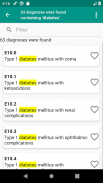
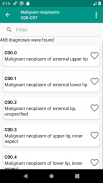
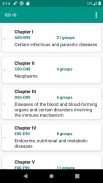

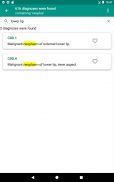

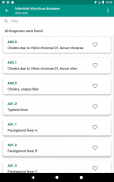
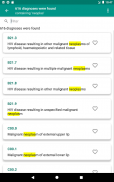
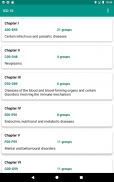
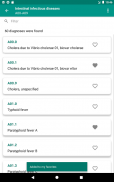
ICD 10

Description of ICD 10
ICD 10 is a mobile application designed for healthcare professionals and individuals seeking detailed information about various diseases and their classifications. This app, available for the Android platform, offers users the ability to explore the International Classification of Diseases, Tenth Revision (ICD-10) codes, which are essential for diagnosis and treatment in the medical field. Users can easily download ICD 10 to access a wealth of medical information at their fingertips.
The app organizes diseases systematically by chapters, groups, and categories. This structured layout allows users to navigate through the extensive database efficiently. Each chapter corresponds to specific types of diseases, making it straightforward to find relevant information based on the user's needs. The categorization enhances the user experience by providing a logical flow of information, facilitating quick access to disease classifications.
A search function is integrated into the app, enabling users to look up diseases by their names. This feature is particularly beneficial for medical professionals who may need to reference specific conditions rapidly. By entering the name of a disease, users can retrieve information promptly, which is crucial in fast-paced healthcare environments. The app ensures that users can find the information they need without unnecessary delays.
Filtering results is another practical feature of ICD 10. Users can refine their searches based on various criteria, which helps in narrowing down the options to find the most relevant information. This functionality is useful for those who may have specific requirements or are seeking information about particular diseases within a broader category.
The app allows users to create a personalized experience by adding and removing diseases from their favorites list. This feature is advantageous for users who frequently reference certain conditions, as it provides quick access to their preferred entries. By customizing their favorites, users can streamline their workflow and enhance their efficiency when using the app.
In addition to traditional search methods, ICD 10 incorporates voice search through Google voice search technology. While this feature requires an internet connection to function, it provides a hands-free option for users who prefer to search using voice commands. This can be particularly useful in clinical settings where multitasking is often necessary, allowing healthcare providers to find information while attending to other responsibilities.
The app is designed to operate without the need for an internet connection, making it accessible in various environments, including areas with limited connectivity. This offline capability ensures that users can rely on ICD 10 for essential information regardless of their location, which is a significant advantage for professionals working in remote or underserved areas.
ICD 10 maintains a user-friendly interface that is intuitive and easy to navigate. This design consideration is essential for ensuring that users, regardless of their technical skills, can operate the app efficiently. The straightforward layout allows users to focus on finding the information they need without being distracted by complex menus or unnecessary features.
Users can expect regular updates to the app, which may include enhancements to existing features or the addition of new content. This commitment to improvement ensures that ICD 10 remains relevant and useful for its audience. Staying current with medical standards and classifications is vital in healthcare, and the app's updates help maintain this relevance.
By utilizing the ICD-10 codes, healthcare providers can ensure accurate documentation and billing, which is essential in the medical field. The app serves as a valuable resource for professionals who require up-to-date information on disease classifications to support their clinical decision-making processes.
ICD 10 is suitable for various users, including medical students, healthcare professionals, and researchers. Its extensive database and easy navigability make it a versatile tool for anyone involved in healthcare. The ability to access critical information quickly can aid in education and training, supporting the next generation of healthcare workers.
Moreover, the app's organizational structure aligns with the needs of users who may be looking for specific information or conducting research on particular diseases. By presenting the data in a clear and concise manner, ICD 10 supports informed decision-making and enhances understanding of complex medical topics.
The combination of features within ICD 10 reflects its purpose as a reliable resource for disease classification and information. Users can efficiently search for diseases, filter results, and customize their experience through favorites, all while benefiting from the app's offline capabilities. This comprehensive tool serves as an essential companion for anyone navigating the complexities of medical information.

























